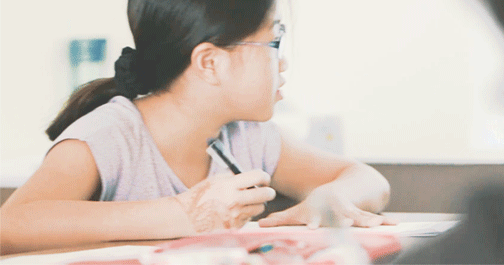
With school just around the corner, your child may feel exam stress building up.
Due to the competitive nature of students in class, your child may feel immense social pressure to do well in his or her exams. If he or she is not particularly doing well in school, such stress may leave your child feeling discouraged.
Identifying Signs Of Stress
For most children, stress can manifest in behavioural changes.
Signs of Emotional Stress




• Apparent “blue” or lonely feelings
• Apathy about appearance
• Frequent outbursts of uncontrollable temper
• Avoidance of others or frequent expressions of desire to be alone
Physical Symptoms of Stress




• Nausea or stomach upset
• Pains in chests or heart
• Recurring headaches
• Sleep difficulties
While negative behaviour is not always linked to excessive stress, if you notice these behavioural changes in your child, they are almost always a clear indication that something is amiss. As a parent, paying attention to these changes in behaviour could help you to determine an appropriate response or intervention in a timely manner.
Helping Your Child Cope With Stress
1. Communicate With Your Young One
You can encourage your child to speak freely about his or her emotions. If your child is feeling the pressure of his or her exams, reassure him or her that it is natural to feel stressed. Ease him or her into the conversation by sharing your own experiences of dealing with stressful situations at work.
2. Cultivate A Positive Mindset
School can be a big stressor as your child spends most of his or her time at school — even more so when topical assessments and exams are used as markers of your child’s performance.
More often than not, your child’s performance in the previous exams could be hindered by poor understanding of the tested curriculum. Take time to sit down with your child to identify the subjects or topics he or she might need some help with. Recognising these areas of concern early will help you and your child come up with a systematic plan to improve his or her performance at the upcoming SA1.
Be sure to give your child lots of verbal encouragement! Knowing that you are working together with him or her will definitely help to boost your child’s confidence and build a positive mindset.
3. Keep In Touch With Your Child's Teachers
At The Learning Lab, we go to great lengths to ensure that your child’s teacher is equipped with the right skillset to help your child cope with stress. Teachers attend stress management workshops so that they can learn how to identify signs of stress in students.

Time Management
Having good time management will help your child better organise his or her workload. During each lesson, teachers share with the class how much time they should be spending on each component or task. Over time, with some encouragement on the part of his or her teacher, your child will improve on his or her time management skills.
Good Revision Techniques
Students often wait until the night before a big test to start creating study guides. However, by then, it is usually too late to seek clarification on content they are unsure about. At The Learning Lab, our teachers guide students on how to take notes during class or keep a learning journal of various concepts and examples. When your child feels well-prepared for his or her tests, he or she will naturally feel less stressed.
A Positive Environment In Class
Our teachers also constantly use positive reinforcement in class. One of the ways we do this is through the use of a star chart system which rewards your child based on his or her behaviour. The chart starts off with 5 stars for each student — stars are only added and not deducted. At the end of each lesson, your child will feel affirmed by the number of stars on their chart. He or she will be motivated to continue behaving well in class and even to excel and earn more stars!
Understanding Your Child’s Learning Needs
Give your child a glimpse into the unique TLL learning journey. Find out how we prepare our kindergarten and primary school students for success in the classroom and beyond.
If you have any enquiries about our programmes, please email us at enquiry@thelearninglab.com.sg or call us at 6733 8711 and we will be happy to assist you.
Final Thoughts
Patience is key. As a parent, it hurts to see your child unhappy or stressed. Focus on helping your child grow into a good problem-solver — a child who knows how to roll with life's ups and downs, put his or her feelings into words, remain calm, and be unafraid to try again.
Parents can't solve every problem a child goes through in life. But by teaching your child healthy coping strategies, you'll prepare your child to manage challenges that he or she may face in the future.

